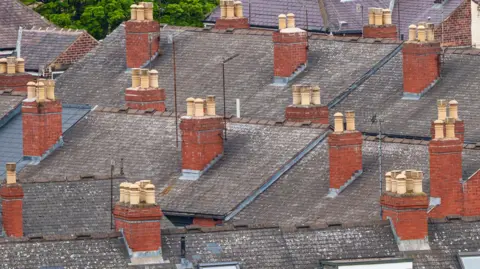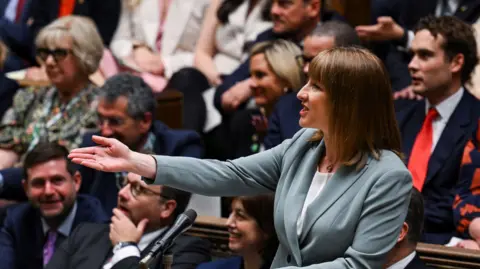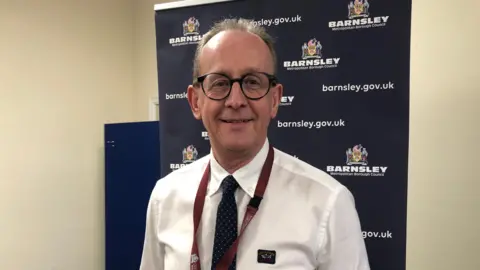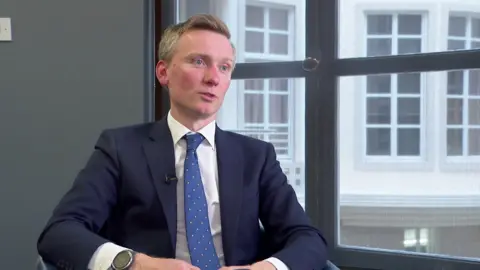Could change to one government rule boost the North's future?
 Getty Images
Getty ImagesChanges to the way the government hands out money to the North have been welcomed - but cynicism remains about whether anything will actually improve. BBC Yorkshire Political Editor James Vincent investigates whether a rewrite of the Green Book will help to bridge the North-South divide.
The Green Book, the government's document that guides decisions on whether projects are value for money, will be updated by Chancellor Rachel Reeves.
In the past, the rules have been seen to favour the South because returns on investment are easier and quicker.
Not many people have heard of the Green Book and - if you're not knee-deep in politics like some (hello!) - there is no reason why you should have.
It's not a book of policies or plans that the government wants to achieve - it's the next level of decision making, behind the scenes.
Is a project value for money? How much risk is there? Will it have an impact?
Civil servants use it to say yes or no to investment plans and some in Yorkshire think it's holding us back.
 Reuters/House of Commons
Reuters/House of CommonsSir Steve Houghton has been on Barnsley Council since 1988 - and though there is a risk of him sending me an angry text if I say this - he's been around local government for longer than most.
"Changes to the Green Book are really, really welcome. We've been calling for this for years and years," he says.
"To ask places, small towns in the North to give economic returns at the same rate as London for public investment has been a nonsense and still is a nonsense."
Sir Steve knows that something built in Barnsley will not have the same immediate financial impact as it would in the South East - but says that's why it is needed more here.
"Having recognition that you're going to get different returns, you're going to get different benefits in different parts of the country, is a real win for us.
"It might not hit the public agenda, the Green Book, but in terms of making sure the government can invest in places other than those big cities like London, it's a real step forward."

For a long time, whether you had a good business case defined whether you were going to get government money or not.
Benefit Cost Ratios (BCR) are the assessments of what the number crunchers in the Treasury think they might get back.
One of the changes to the Green Book is to rely on BCRs less and have other benefits included, like societal ones, rather than just money.
The government also wants the Treasury to look at what transformational changes might happen in an area because of investment.
It also wants the Green Book to be smaller. At the moment the guidance can run into thousands of pages.
We've been here before though. The Conservatives changed the Green Book under Rishi Sunak's leadership.
They said it was to help areas in the North, but that was undermined by the PM's comments to voters in Tunbridge Wells where he told them he had taken money out of urban deprived areas.
The Conservatives' Levelling Up Fund was also criticised for weighting the prime minister's constituency of Richmond as in higher need than Barnsley.
We asked the Conservatives for their view on these changes but they did not respond.
'Raise investment across the country'
I sat down with Treasury Minister Torsten Bell to ask him whether Labour would also be accused of funding bias.
"You obviously do need cost benefit analysis of transport schemes but what we can't have is a system for doing that that is biased against certain parts of the country, that only funnels money to parts of the country that are already successful," he says.
"We all deserve a public realm that functions, and just because somewhere has lower incomes today doesn't mean that is always the case, in fact our policy should be to start turning that around."
But are they heading down the same road as the Conservatives in favouring their own areas?
"No, what we're doing is saying we need to raise public investment levels right across the country and we're making sure Yorkshire benefits from that like we are for every region.
"It's not about setting parts of the country against each other."

The reality is that different parts of the country are wealthier than others.
Whether that ever changes is a huge question, and one that has faced every new government.
Bridging the gap between North and South is the aim of these structural tweaks.
How long will we have to wait to find out if it works? Well, no government has cracked it so far.
